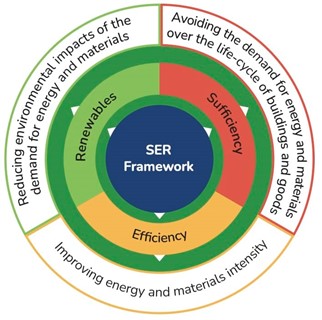Chief Investigators: Adjunct Prof David Ness, Assoc Prof Ke Xing, Assoc Prof Allan O’Connor (C-Edge), Prof Ying Zhu (C-Edge), Dr Yamina Saheb (Sciences Po Paris).
Year commenced: 2022. Completion of current phase by 31 July 2023. More extensive and intensive research is then planned.
Problem
In its 2022 Report on Climate Change Mitigation, the IPCC highlighted the importance of sufficiency in climate change mitigation and achieving drastic and urgent actions to begin arresting warming curve by 2025.
It defined Sufficiency as avoiding demand for energy, land, materials and water while providing well-being for all within planetary limits.
Policies and actions to date, which focus on resource efficiency, circularity and renewables are not enough; sufficiency should be first within a SER Framework (diagram). This is especially important to the built environment, which is responsible for around 40% of resource consumption and carbon.
While France recognises sufficiency in decarbonising its energy system, the concept is relatively unknown within Australia. SIRM is therefore collaborating with IPCC lead author Dr Yamina Saheb, responsible for introducing sufficiency in the 2022 Mitigation Report, and Sciences Po Paris, a prestigious French institution, to examine and establish sufficiency-oriented approaches for decarbonising the built environment.
The partnership between Sciences Po and UniSA promises mutual benefits for France and Australia, extending to the Indo-Pacific and China
Project Summary
In seeking to introduce sufficiency policies and practices in Australia and beyond, the research team has won funding from Australian-French Research and Innovation Association (AFRAN), and defined the following phases:
- In partnership with Arup, begin dialogues with key government and industry organizations
- Co-organize with World Resources Forum (WRF) a Webinar on Sufficiency, to be held end November 2022.
- Arrange 1st International Sufficiency Forum (online/hybrid) to be held mid-February 2023, in partnership with AFRAN, Arup, WRF and others. This is planned to include live audiences in Sciences Po Paris and UniSA, with online links to China and SE Asia.
- The major session of the Forum (led by UniSA) will be focused on Sufficiency in Urban Development and Human Settlements, including planning, buildings, infrastructure, and mobility.
- A key aspect of the event will be the establishment of a Sufficiency Website, assisted by funding from AFRAN. This will enable promotion of the event, record of proceedings, and their publication and dissemination
- Preparation of a journal paper, that will also examine metrics for sufficiency.
As sufficiency may have some negative connotations, a key aspect of the project will be to examine how sufficiency may become a powerful driver for innovative and equitable ways to deliver service needs and well-being for all, while reducing absolute resource consumption. For industry, this involves examining new business models that lead to innovative solutions for clients, involving less cost and less new construction, which lead to increased and alternative employment opportunities and community resilience.
Impact
With a focus upon urban planning and built environment, the research aims to:
- Foster French-Australian collaboration on introducing sufficiency into climate, energy and resource policies in (firstly) South Australia, Australia, Indo-Pacific, China and beyond, thereby extending the AFRAN network.
- Raise awareness of sufficiency and begin dialogues in Australia and beyond.
- Initiate policy changes, enabling drastic, urgent reductions in resource consumption and carbon to limit global warming to 1.5 degrees.
- Demonstrate how sufficiency may unleash opportunities for innovation, especially via new business/development models and links to Industry 5.0
The following publications indicate the scope and importance of this research;
Saheb, Y. 2021a. COP26: Sufficiency should be first, Buildings and Cities, Oct.
Saheb, Y. 2021b. Sufficiency and Circularity: the two overlooked decarbonisation strategies in the ‘Fit for 55’ package, European Environmental Bureau, October.
Ness, D. 2022. Sufficiency: cutting carbon by building less, Sufficiency, Circularity and Systems, SASBE Webinar, 25 May.
Ness, D. & Xing, K. 2017. Towards a resource efficient built environment: a literature review and conceptual model, Journal of Industrial Ecology, April.

The Sufficiency, Efficiency, and Renewables (SER) Framework (courtesy Saheb, 2021a)



